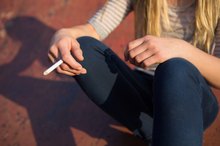The Negative Effects Electronics Have on Teens
Children and teenagers spend an average of four hours a day just on television time, according to the Palo Alto Medical Foundation. Add in computer time, time spent on the Internet or smart phone, and video game playing, and it's easy to see how teens can spend a significant chunk of their waking time plugged in. Electronics, while useful for communication, schoolwork and entertainment, can cause problems if they're overused.
Increased Obesity Risk
Too much screen time can promote a sedentary lifestyle -- one of the major contributing factors to obesity and a major risk factor for heart disease, according to the Texas Heart Institute. As many as 33 percent of teens are obese, according to estimates by the American Academy of Child and Adolescent Psychiatry published by the Texas Heart Institute. Obese teens are more likely to grow up to become obese adults, giving them an increased risk for chronic health conditions, including heart disease, diabetes and arthritis. Trading even just 30 minutes of electronics time per day for physical activity can help significantly reduce these risks.
- Too much screen time can promote a sedentary lifestyle -- one of the major contributing factors to obesity and a major risk factor for heart disease, according to the Texas Heart Institute.
- Obese teens are more likely to grow up to become obese adults, giving them an increased risk for chronic health conditions, including heart disease, diabetes and arthritis.
Increased Aggression
Exercises for Kids Who Want to Lose Weight
Learn More
Teens whose electronic time includes violent television and video games may also experience increased aggression, according to the Palo Alto Medical Foundation. Teens who spend a significant amount of time playing violent video games or watching violent television shows are more likely to fight with their peers, argue with their teachers and generally engage in more aggressive behaviors.
Sleep Problems
Electronics in your teenager's bedroom can negatively affect his normal sleep cycle. Late-night texts, phone calls and emails can keep your teen from sleeping soundly even if he's not reading or answering them, explains TeensHealth.org, an online parenting and health information resource maintained by the Nemours Foundation. Encourage your teen to turn his computer and phone off at bedtime to eliminate sleep-disrupting updates.
Potential Mental Health Problems
Lack of Energy in Teens
Learn More
Spending too much time playing video games can increase depression in teens who have a predisposition to social or mental health problems, notes researcher Douglas A. Gentile, an associate professor of psychology at Iowa State University who studies the link between video games and depression, in a January 18, 2011 article in "The New York Times." According to Gentile, teens with mental health issues may turn to video games for relief, but then become addicted to playing, causing social, academic and emotional problems that may last well into adulthood. In some cases, teens become so addicted to video games that they can become isolated and depressed. Parents can help by monitoring game time and limiting it where appropriate, advises Gentile.
- Spending too much time playing video games can increase depression in teens who have a predisposition to social or mental health problems, notes researcher Douglas A. Gentile, an associate professor of psychology at Iowa State University who studies the link between video games and depression, in a January 18, 2011 article in "The New York Times."
- According to Gentile, teens with mental health issues may turn to video games for relief, but then become addicted to playing, causing social, academic and emotional problems that may last well into adulthood.
Related Articles
References
- Centers for Disease Control and Prevention: Electronic Media and Youth Violence
- TeensHealth.org: 5 Ways to Reboot Yourself
- "The New York Times"; Video Games and the Depressed Teenager; Roni Caryn Rabin; January 2011
- Texas Heart Institute: Heart Disease Risk Factors for Children and Teenagers
- Li AY, Chau CL, Cheng C. Development and validation of a parent-based program for preventing gaming disorder: The game over intervention. Int J Environ Res Public Health. 2019;16(11). doi:10.3390/ijerph16111984
- Jeromin F, Nyenhuis N, Barke A. Attentional bias in excessive internet gamers: Experimental investigations using an addiction Stroop and a visual probe. J Behav Addict. 2016;5(1):32-40. doi:10.1556/2006.5.2016.012
- Hong JS, Kim SM, Jung JW, Kim SY, Chung US, Han DH. A comparison of risk and protective factors for excessive internet game play between Koreans in Korea and immigrant Koreans in the United States. J Korean Med Sci. 2019;34(23):e162. doi:10.3346/jkms.2019.34.e162
- Ra CK, Cho J, Stone MD, et al. Association of digital media use with subsequent symptoms of attention-deficit/hyperactivity disorder among adolescents. JAMA. 2018;320(3):255-263. doi:10.1001/jama.2018.8931
Writer Bio
Holly Roberts is an award-winning health and fitness writer whose work has appeared in health, lifestyle and fitness magazines. Roberts has also worked as an editor for health association publications and medical journals. She has been a professional writer for more than 10 years and holds a B.A. in English and an M.A. in literature.









